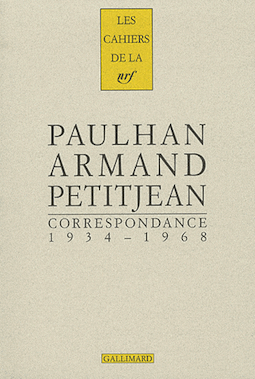
Jean Paulhan, Armand Petitjean, Correspondance, 1934-1968
édition établie et annotée par Martyn Cornick (University of Birmingham, R.-U.)
Paris, Gallimard, coll. "Les Cahiers de la nrf", 2011, 736 p.
- ISBN : 9782070131778
- Prix : 36 €
Présentation de l'éditeur :
« Il va sans dire que lorsque la question se posera : les quelques centaines de lettres qu'il m'a écrites sont à la disposition de celui, celle ou ceux qui assumeront la responsabilité de son "héritage" littéraire » (lettre 695).
Ce post-scriptum de la lettre d'Armand Petitjean écrite le 10 octobre 1968, au lendemain de la mort de Jean Paulhan, et reçue par Dominique Aury, dernière compagne du directeur de La Nouvelle Revue française, reflète bien la prescience historique et la sensibilité de l'auteur. Ce corpus de presque sept cents lettres s'échelonne sur plus de trente ans, de 1934 à 1968. Le lecteur assiste de près à une véritable et passionnante aventure intellectuelle à travers la période la plus turbulente du XXe siècle : les journées de février 1934, le Front populaire, l'Anschluss, la crise de Munich, la « Drôle de Guerre », la défaite, l'Occupation, la Libération, les débuts de la Guerre froide, la résurrection de La NRF en 1953, la crise algérienne, l'établissement de la Ve République… Indissociable de cette aventure intellectuelle, et actrice aussi capitale que les deux hommes, s'illustre La NRF elle-même, déjà bien établie en tant qu'institution politico-culturelle.
Qu'apprend-on à la lecture de ces lettres, en sus de leur inestimable valeur historique ? Par-dessus tout, il s'agit de l'amitié. Dès le début, les deux hommes ont conscience d'être sur la même longueur d'ondes. Comme dans toute amitié qui dure, il y a pourtant des querelles et même des menaces de rupture. Des différences vont les opposer, notamment sous l'Occupation. Tour à tour, les lettres révèlent l'humour partagé, la franchise, la fidélité, l'intelligence de cette amitié, en dépit des colères, des vicissitudes, des réconciliations qui la soumettent à l'épreuve.
Aléas du destin, aléas de l'histoire, complicités et discussions, exigences à l'égard de soi, à l'égard de l'ami, affection indéfectible : la correspondance de ces deux hommes nous livre enfin ses richesses, sa complexité humaine et historique.
Martyn Cornick est professeur d'histoire de la culture française à l'université de Birmingham, au Royaume-Uni. Il est spécialiste de La Nouvelle Revue française, et l'auteur de nombreux travaux sur la revue de Jean Paulhan.
“It goes without saying that when the time comes, the several hundred letters which he [Jean Paulhan] wrote to me are available for those who take responsibility for his literary inheritance.” This postscript to Armand Petitjean's letter of condolence, written the day after Paulhan's death on 10 October 1968 and sent to Dominique Aury, reveals much about the sensitivity and historical foresight of the author. This edition of almost 700 letters testifies to a genuine exchange between the two men, spanning more than thirty years between 1934 and 1968.
The reader accompanies Paulhan and Petitjean on an exhilarating intellectual journey through the most turbulent years of the twentieth century, gaining an insight into their hopes and disappointments regarding the upheavals of 6 February 1934, the Popular Front, the Anschluss, the Munich crisis, the Phoney War, the Defeat of 1940 and the Occupation, through the Liberation and the early days of the Cold War, on to the relaunch of the NRF in 1953, the Algerian War and the founding of the Fifth Republic. Inseparable from this intellectual adventure is the NRF itself, a protagonist in its own right, already established in the 1930s as France's leading cultural institution. Here, we gain a fresh look at the inside workings of the review.
Apart from their historical value, what do we learn from these letters? Above all, we learn about Paulhan and Petitjean's friendship; until now we have had little idea about how profound this friendship was. At the beginning, writing to each other while Petitjean was absent from Paris on military service, they discovered they were on the same wavelength. At the height of his authority at the NRF, Paulhan realised how his new recruit could contribute to the review's renewal, and for a while Petitjean fulfilled the role of editorial assistant. As in any long friendship, there were disagreements, even threats to end their association. During the Occupation, their differences were considerable, yet after the Liberation, Paulhan would strive tirelessly to have Petitjean's name removed from the blacklist of literary collaborators. Here, we discover why. By turns, the letters reveal the shared complicity, the frankness, the humour, the loyalty, the sheer intelligence of their friendship, in spite of the ups and downs and the reconciliations which, occasionally, tested it.
The vagaries of fate and of history, intellectual debate and personal dilemmas, periods of self-doubt, demands made of one friend by the other, admiration and affection: this correspondence can now deliver up its riches, in all its human and historical complexity.
Martyn Cornick is Professor of French Cultural History in the University of Birmingham, UK. He specialises in the history of the Nouvelle Revue française, and is the author of numerous studies on Jean Paulhan's review.